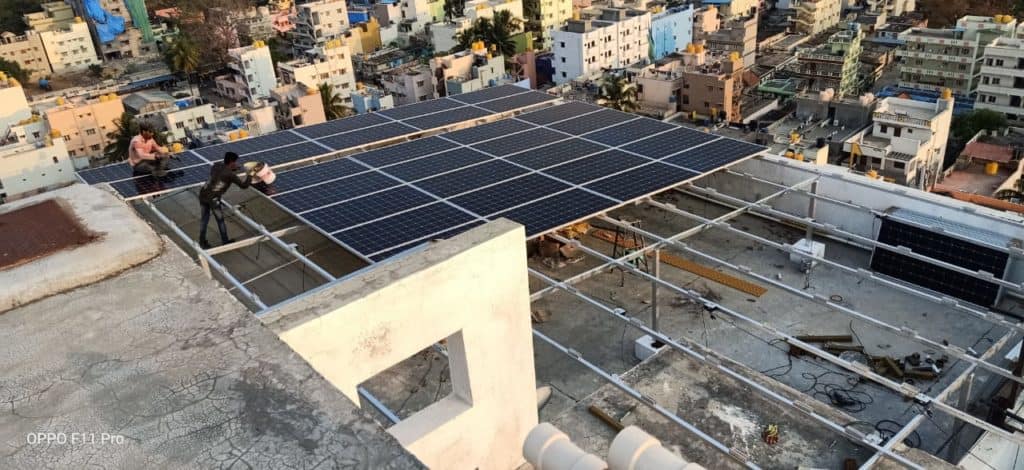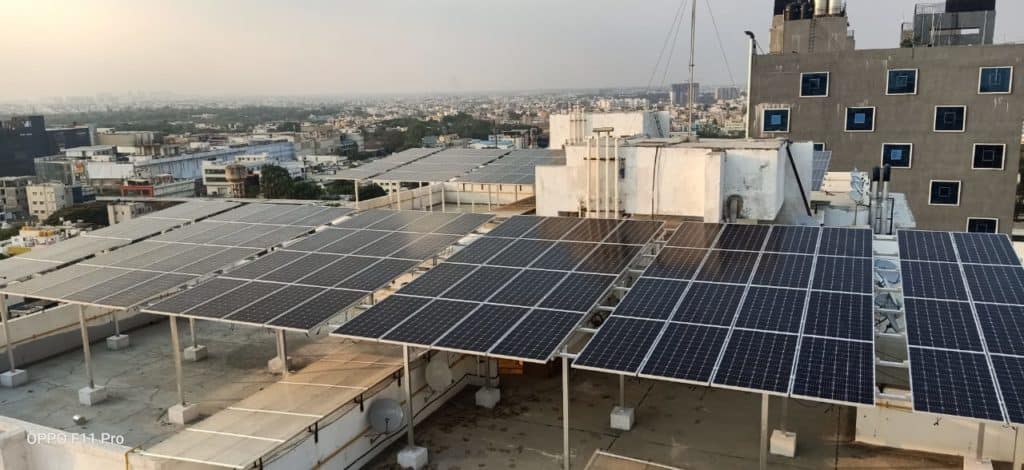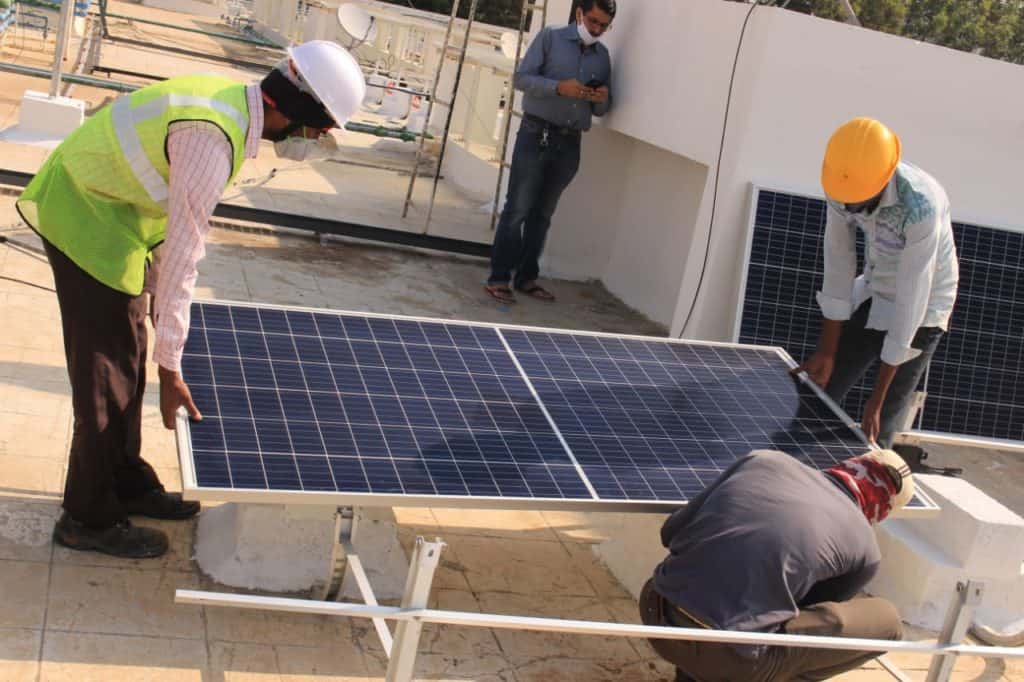Vishnu Gattupalli is a happy Management Committee (MC) member of his apartment, Trifecta Starlight, located at Mahadevapura. Their newly commissioned 84 kWp solar power plant helps them save more than 80,000 rupees each month on common area electricity bills.
“We are extremely happy to have the rooftop solar power plant that has no direct emissions”, says Vishnu. The committee was inspired by the success stories of solar installations in other apartments.
Vishnu who is also Secretary, Whitefield Cluster of Bangalore Apartment Federation (BAF), says over 30 apartments in the city have adopted solar rooftop. Rooftop solar systems are now an integral part of Karnataka’s solar policy.
Apartments rush installation as policy changes are expected
The 2018 KERC (Karnataka Electricity Regulatory Commission) rule allows net metering. This has proved beneficial to individual customers as well as apartments, compared to gross metering.
In some states like Maharashtra, consumers had opposed the policy to move to gross metering.
Net Metering vs Gross Metering In net metering, the apartment complex uses the solar power generated for its common area needs, exports excess power to the grid, and draws BESCOM power for any shortfall. It only pays for the net amount consumed, i.e units consumed minus units exported. With gross metering, the total energy generated by the solar rooftop plant is to be uploaded into the grid without being consumed directly by the consumer. BESCOM pays the plant owner as per the BESCOM buyback rate. The apartment consumes BESCOM power for its needs, and pays BESCOM the standard electricity rates.
In Karnataka, talks of moving to gross metering for loads above 5 kWp has led to anxiety and a rush to avail the benefits of the current net metering policy. Kazi Zaman, Secretary of Sobha Petunia, Nagavara, says, “there is a race for apartment complexes to complete execution by March 31, in case KERC policy changes next year.”

There may also be other changes in the solar rooftop policy like rooftop capacity limit and changes in tariff.
The key benefit: reduced expenses
The rule of thumb, Vishnu explains, is that a 100 kWp solar plant, costing around Rs 50 lakh, can lead to savings of Rs 1 lakh a month. (kWp stands for kilowatts peak – energy generated during peak performance. Since BESCOM’s agreement would be with the apartment association, the solar power generated can be used only in common areas which is under the association’s control, and not in individual flats.) For most apartments, taking into account subsidies and changing bank rates, this could mean a four-year Return on Investment.
Vishnu’s apartment formed a small sub-committee who researched possible installation options. He explains, “We shortlisted three vendors and finalised Hyde Source in a transparent manner, based on the choice of majority of owners.”

Satish Mallya from Century Saras, Yelahanka, also points to the importance of getting the community’s buy in. “We estimated a cost of Rs 30 lakh for installing the plant and hence our first hurdle was to convince all the flat owners to invest in it,” says Satish.
The Managing Committee started exploring the idea in late 2018, and put together a team of technical and financial experts. Century Saras’ solar plant was inaugurated on the occasion of World Environment Day this June 5th.
The apartment has significant common area power costs, constituting 20-25% of the total maintenance charges. The average monthly energy consumption of their common areas was 8122 units, and the monthly BESCOM bill earlier was around Rs 75,000. Satish says the rooftop solar system will “save almost 80-83% of the power expenses for the apartment, and the investment will be recovered in 4.5 years”.
BESCOM far from achieving target for rooftop solar power
India has set an ambitious target of installing 175 GW of renewable energy by 2022, of which 100 GW would be solar energy. Experts say the country is on track and will easily achieve this target.
At present, India’s total solar installed power stands at 37 GW, almost 10% of the total power capacity of the country. Moreover, Karnataka remains the highest solar energy producing state in India. As per recent trends, Karnataka has a total installed solar power capacity of 7,100 MW.
With a growing population and its aspirational lifestyle, Bengaluru’s power consumption is only increasing. Electric Vehicles and new-fangled appliances are only adding to the demand.
BESCOM’s target is to generate 1200 MW electricity from rooftop solar panels by 2022. BESCOM’s Renewable Purchase Obligation makes it mandatory for it to purchase a minimum of 8% of its total energy from renewable sources. However, as per the BESCOM’s July 2019 data, Bengaluru’s solar rooftop power capacity stood at 205 MW.
Regulatory challenges
One key issue that limits the growth of solar is the KERC regulation that limits rooftop solar plants to a maximum of 50 kWp per LT (Low Tension) meter or original sanctioned load, whichever is lower. This limits most apartments to 50 kWp even when their consumption (and potential to generate solar power) is higher.
Century Saras, a medium-capacity apartment with 128 flats, consumes 70 kWp in common areas and has a sanctioned load of 90 kW. They got approval only for a 49.7 kWp solar plant.

This limits the incentive for medium-size apartments that have the capacity to generate more. “BESCOM must remove this 50 kWp limit,” says Vishnu. Large apartments are less constrained, as they often have separate LT meters for each block, so the total sanctioned load across blocks works out to be a higher number.
Capex or Opex?
Currently there is no policy where apartments can lease their terrace area to power solar generators. Apartments have to install, generate and consume the power themselves. This can prove challenging in apartments which are not able to raise required capital.
One workaround is to partner with private firms which invest in the plant with the required capital.
Prestige Greenwoods on OMR Road has a 50 kWp rooftop solar power plant, installed on an op-ex model in partnership with a vendor. The vendor installed the plant at their own cost, and takes care of the operations and maintenance, with the apartment paying a refundable deposit. Pradeep Pai, a MC member, says “We are really happy with this project.”
The apartment pays the vendor for the solar power at a rate lower than BESCOM’s. The arrangement saves them Rs 15,000 a month. They also have the option to buy the plant after five years on a Build-Operate-Transfer (BOOT) model.
Cost savings and beyond
Brigade Petunia in Banashankari II Stage was one of the earliest apartments to go in for a solar rooftop system. They commissioned a 96.2 kWp plant in August 2018, at the cost of Rs 52 lakh. The plant now covers over 92% of the apartment’s common area electricity needs, and saves them around 1 lakh in electricity bills. They expect to break even in another two years.
Nikhil Grover, their former MC member has this advice for apartments considering solar power, “Better to do it now than later. The faster you do, more the savings in the long term.”
There are also larger environmental benefits. Century Saras has calculated the impact of their solar plant as saving 54 tonnes of CO2 per year and equivalent to planting 894 trees per year. Something that benefits not just apartment residents but society at large.
Note: Meera K contributed to this article.
[Corrigendum: The cost of setting up rooftop solar plant in Century Saras apartment was incorrectly mentioned as Rs 35 lakh earlier. It has been corrected to Rs 30 lakh.]
[Read Part 2 of this series – A guide to installing rooftop solar system in your apartment.]
Also Read:
SolarSquare Energy is proud to have executed the prestigious project at Century Saras Apartments! We have loved working with knowledgeable and quality conscious management committee of Century Saras.
Sir, I am Dr. Garg, from Purva Venezia Apartments, Yelahanka New Town, Bangalore-560064. We are thinking seriously to install Roof Top Solar Syste , before 31st March, 2021. There is no doubt about viability of project.
You just talked about Brigade Petunia
Apartments who installed this system in 2018. Can you provide contact no. of any of their fuctionaries. It will be a great favour to me.
Just FYI , in my 8falat appartment, I have built 20ke solar Rooftop and 5kw wind Rooftop without bescom power. This building stands 100% on renewable energy with 2 days blackout support if any. Plan executed in 2018/19 and costed equal to the cost demanded by bescom. Good investment and no power bills for next atleast 30 years. Savings approx 4lakh per annum. Still we have 60% excess power remained unutilised. Worth every penny.
Thanks Vishnu. It was an absolute pleasure for us at Hyde Source, to work on the 84kW project. The support by the Trifecta Committee during the times of pandemic, helped us a great deal in the successful execution of the project. Also appreciate the active effort taken by you and other members of the BAF, in promoting solar.
Karnataka is pro-people state.
India has to gear up on roof top solar power generation across the states. It has to be made mandatory to install solar power on all residential apartments for their common area lighting this saving the electricity considerably. A rebate in GST has to be given as incentive to apartments projects.
We live in an apartment with 80 flats.
Common area electricity bill comes around 50k.
We are discussing to install solar panels ..which can supply power to
Common area
Lift – 2nos
Water motar 2 nos.
Can you plz guide us.
Sir,kindly let me know pl,for how many years can we generate electricity by solar system once we install it.
Hi, solar panels has warranty of 25 years. It will continue to work with lower performance.
Which state is not pro people? Theres a reason why population is bursting at its . All are pro people not pro flora nor fauna
Please help me with your contact details. i would like to do same in my apartment.
Please see Part 2 of this article https://bengaluru.citizenmatters.in/guide-to-install-rooftop-solar-power-in-bangalore-apartments-bescom-kerc-net-metering-54723 wherein some vendors are mentioned like EcoSoch Solar, Hyde Source, etc. You can contact them for your project.
Sir. I am satish Mallya neighbourhood apartment in yelahanka. Some of your management committees members are in touch with me .You can visit Century Saras
Is there any capital subsidy scheme for rooftop for common utilities in apartments
We have only 76 flats and currently only 10% of maintenance is spent on electricity for common area Can rooftop solar benefit us. ?
My name is Srinivas. I’m the president of Sri Venkateshwara Nagar Layout, in Jakkur. I’m impressed and thoroughly convinced about the monetary savings and saving mother earth. Really in search of some genuine guidance.